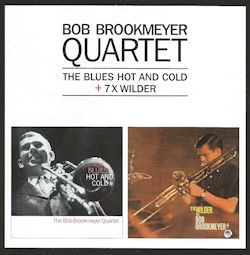The Blues Hot and Cold
1. On the Sunny Side of the Street
2. Stoppin’ at the Savoy
3. Languid Blues
4. I Got Rhythm
5. Smoke Gets in Your Eyes
6. Hot and Cold Blues
Bob Brookmeyer – Valve trombone
Jimmy Rowles – Piano
Buddy Clark – Bass
Mel Lewis – Drums
7 x Wilder
7. While We’re Young
8. That’s the Way it Goes
9. The Wrong Blues
10. It’s So Peaceful in the Country
11. Blues for Alec
12. I’ll Be Around
13. Who Can I Turn To?
Bob Brookmeyer – Valve trombone, piano
Jim Hall – Guitar
Bill Crow – Bass
Mel Lewis – Drums
Most jazz fans will remember the classic version of The Train and the River that Jimmy Giuffre’s trio played at the Newport Jazz Festival in 1958,
immortalised in the famous film Jazz on a Summer’s Day. One thing that strikes me about it is that it gains a lot from the presence of Bob
Brookmeyer’s valve trombone. He supplied sounds like a train hooter, and his gruff tone added weight to the performance. Brookmeyer is, indeed, a master of
that very difficult instrument, the valve trombone, as he shows on this CD which gathers together two LPs – the first from 1960, the second from the year
after.
Bob displays his expertise on the very first number, where he often makes burps and even ruder noises with this trombone. These are threaded carefully into
a masterly solo which also contains strands of melody and examples of Bob’s brilliant technique. On the Sunny Side of the Street is taken very
slowly, not at the usual jaunty tempo, but this enables Brookmeyer to savour the chord sequence. Bob’s theme statement includes wild slurs alongside his
usual furry and rasping tone. Towards the end of the melody, Bob turns a fluffed note into a new direction, leading into a jolly dance tune. Bob’s second
chorus starts with a display of fireworks. Pianist Jimmy Rowles takes the second half of the chorus and shows himself an able disciple of the Brookmeyer
taste for the unexpected. Bob’s closing statement takes all kinds of unexpected journeys.
None of the other tracks can quite come up to the mastery of this opening track, though some come close. Brookmeyer’s penchant for humour is present in the
title of the next tune: Stoppin’ at the Savoy. This uses the chord sequence of the better-known Ducal composition. Bob and Jimmy sail through
their solos, then they swap fours with some rather four-square drum solos from Mel Lewis.
Languid Blues
is just what it says on the tin. I Got Rhythm is more lively, with Bob really going to town. Jimmy Rowles takes a very adventurous solo, which
seems ready to stray playfully. He and bassist Buddy Clark fall silent while Bob and Mel swap fours.
Smoke Gets in Your Eyes
– like On the Sunny Side of the Street – is interpreted at a very slow tempo but, again, it allows Brookmeyer space to try out all kinds of aural
experiments., with a quote from Did You Ever See a Dream Walking thrown in, plus hints of Smoke Gets in Your Eyes in the coda.
On the second album, Bob Brookmeyer was reunited with an old friend from the Jimmy Giuffre Trio: Jim Hall. The prevailing temperature of this album is
cooler than its predecessor, as the line-up of guitar, bass and drums -q with Brookmeyer doubling on trombone and piano - doesn’t seem inclined to generate
as much volume. You might describe much of it as chamber jazz. Besides, the repertoire consists largely of songs composed by Alec Wilder, and they intend
to have a more restrained approach. And Bob’s sparse (yet percussive) piano style reduces the heat quotient.
The most familiar song here is probably I’ll Be Around, which is jaunty but still slightly restrained. Even Mel Lewis’s drum solo seems somewhat
reticent. Blues for Alec was written by Brookmeyer in tribute to Alec Wilder. It is a surprisingly solemn piece, with none of Bob’s habitual wit.
All in all, I prefer the first of these LPs to the second – but they both contain much musical enjoyment and skill.
Tony Augarde
www.augardebooks.co.uk
